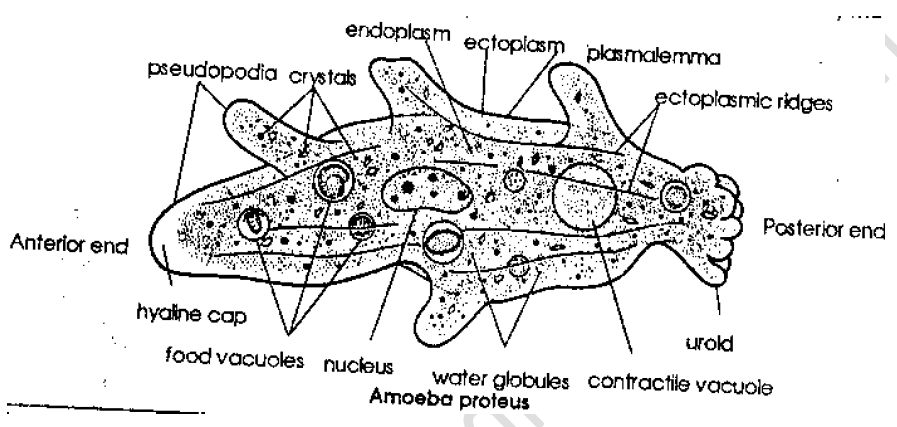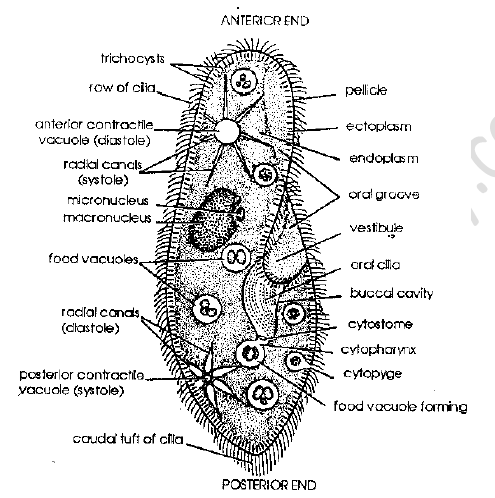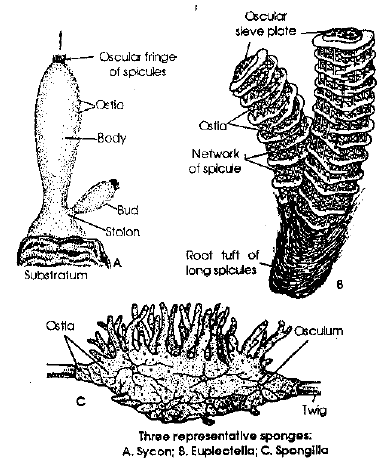The kingdom Animalia exhibits enormous diversity.

The animals have been classified according to certain characters such as unicellularity/multicellularity, simple or complex organization of the body, number of germ layers in animal body, symmetry of the body, presence or absence or coelom and notochord. The animals are classified and arranged progressively from simple single celled protozoan to highly complex animals.
The tow major groups are Invertebrata and Chordata according to the presence
or absence of notochord. A notochord is present at sometime in the life of a chordate.
Non-chordates do not poses notochord at any stage of their life.
The invertebrates i.e., animals without a backbone, include a number of phyla namely Protozoa, Porifera, Coelenterata, (Cnidaria). Plathyhelminthes, Nematode, Mollusca and Echinodermata. The chordates include protochordates and vertebrates.
4. 1 PHYLUM PROTOZOA:
(Earl animals)
The members of this groups are unicellular aquatic (fresh water or marine) Solitary or colonial forms. The shape of the body may be irregular spherical or flattened and provided with flagella, or cilia or pseudopodia, for locomotion. The organisms possess a single nucleus or they may be multinucleate. The cytoplasm is differentiated into outer ectoplasm and inner endoplasm. The members show heterotrophic mode of nutrition and some are parasites. They reproduce asexually by binary fission or multiple fission and sexual reproduction is effected b conjugation e.g., Amoeba, Paramecium and Plasmodium.

4.2 PHYLUM PORIFERA
They are sedentary aquatic (marine or freshwater) and multicellular organisms. They are commonly referred to as sponges which shown radial symmetry. In the animals that show radial symmetry the body can be divided into equal halves by any number of planes passing through the centre from top to bottom. The surface of the body is perforated by numerous minute apertures called ostia and the single large opening on top is called osculum. Due to the presence of numerous pores on their body they are called porifera. There is a canal system in the body jwhich allows water current to flow n and out of the body. Water brings O2 and food. Poriferans have an internal skeleton of calcareous or siliceous spicules embedded in the mesenchyme or sponging fibres. The other cells in the body are the choanocytes or collar cells, which help in water circulation and nutrition; amoebocytes which perform a multitude of functions and scleroblasts, which secrete the material for the skeleton. Poriferans lack nervous or senory ell but have great capacity to regenerate. Tissue organization is also lacing.

Reproduction in sponges is varied. One method is through regeneration. A small piece of sponge will slowly grow and regenerate the lost parts. Vegetative reproduction by budding is also common. Asexual reproduction takes place by the production of special bodies called gemmules. Sexual reproduction is also seen. Gametes are formed from amoebocytes. A free-swimming larval stage is present, which helps in dispersal of species. Ponges are diploblastic animals. [Presence of two germ layer in the embryo.]
Examples: Sycon, Euplectella, Spongilla
4.3 PHYLUM CHIDARIA OR COELENTERATE
The members of this group are freshwater and marine forms which are solitary of colonial forms. They are radially symmetrical which means their body can be divided into equal halves by any number of planes passing through the centre from top to bottom.
They have a central body cavity called the gastrovascular cavity which communicates with the exterior through the mouth. The body wall is made up of two layers of cells, an outer wall I made up of two layers of cells, an outer ectoderm and inner endoderm a jelly like layer of non-cellular material known as mesoglea is present.Conidarians exhibit two basic body forms (dimorphism), a fixed polyp, and a free swimming medusa.
The polyp is sessile, solitary or colonial resembling a cylindrical stalk with mouth the tentacles facing upwards. The polyps give rise to medusa by vegetative budding.The medusa is solitary and free swimming form and resembles a bell or umbrella with mouth and tentacles facing downwards. (upside down polyp). The medusa produce gamets which after fusion produce polyps. In colonial form, polyps and medusa alternate with each other during the life cycle which I called metagenesis. (Both medusa and polyps are diploid structures).
The Cnidarians have tentacles and nematocyst on stinging cells called cnidoblasts which help to capture the prey.
The nematocysts serve the function of paralyzing the prey by injecting poson or to hold the prey.
The nervous system consists of a nerve network. Those cndarians with hard skeleton made of lime are called corals.
Both sexual and asexual reproduction occur in coelenterate. Asexual reproduction is mainly by budding. Hydra is a hermaphrodite. Having both tests and ovaries in the same organism.

